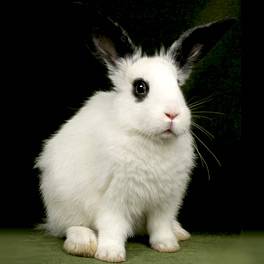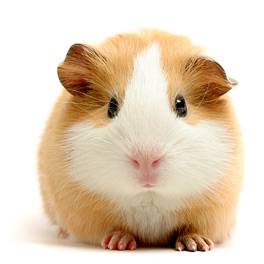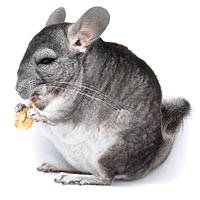As the saying goes, prevention is always better than cure. This holds especially true for small mammals who have a small body reserve and are fragile. Examples of small mammals kept as pets in Singapore are rabbits, hamsters, guinea pigs, chinchillas, mice and rats. Nutrition is an extremely important aspect of keeping small mammals healthy.
Water
Clean water must be accessible at all times. A sipper bottle is ideal as it prevents contamination by faeces, bedding, food and urine. The water should be changed daily.
Food as environmental enrichment
Animals in the wild spend alot of time foraging for food. Being kept in a boring environment can lead to behavioral issues. Food can be used to stimulate pets. Examples are hung up hay balls, or food stuffed into toys or small boxes or toilet paper rolls.
 Rabbits
Rabbits are strict herbivores and are hindgut fermentors. They require a large amount of fibre in their diet for intestinal health as well as to help wear down their teeth. Rabbits have continuously growing incisors and molars that can become overgrown and lead to dental ulcers. Grass hay should form the bulk of a rabbits diet. A reasonable rabbit diet should include 80% grass hay, 10% fresh vegetables and 10% commercial pellets. Hay should be stored in a cool and dry area as it can become moldy easily. Healthy rabbits should have small firm well formed fecal pellets and should defecate frequently.
Summary: Feed lots of (free flow) grass hay! Maximum 1/2 cup per 2kg bodyweight of pellets per day.
Rabbits
Rabbits are strict herbivores and are hindgut fermentors. They require a large amount of fibre in their diet for intestinal health as well as to help wear down their teeth. Rabbits have continuously growing incisors and molars that can become overgrown and lead to dental ulcers. Grass hay should form the bulk of a rabbits diet. A reasonable rabbit diet should include 80% grass hay, 10% fresh vegetables and 10% commercial pellets. Hay should be stored in a cool and dry area as it can become moldy easily. Healthy rabbits should have small firm well formed fecal pellets and should defecate frequently.
Summary: Feed lots of (free flow) grass hay! Maximum 1/2 cup per 2kg bodyweight of pellets per day.
 Guinea pigs
Guinea pigs are herbivores and require a similar diet as rabbits with plenty of grass hay and greens and limited commercial pellets. They have continuously growing incisors and molars, which like the rabbit wear down with the normal action of eating. In addition, guinea pigs require an external source of vitamin C. Foods that contain Vitamin C include grass hay and dark green leafy vegetables. Rabbit pellets should not be fed to guinea pigs as they contain excessive levels of Vitamin D.
Summary: Feed lots of (free flow) grass hay! Give only limited pellets. Include dark green vegetables for Vitamin C
Guinea pigs
Guinea pigs are herbivores and require a similar diet as rabbits with plenty of grass hay and greens and limited commercial pellets. They have continuously growing incisors and molars, which like the rabbit wear down with the normal action of eating. In addition, guinea pigs require an external source of vitamin C. Foods that contain Vitamin C include grass hay and dark green leafy vegetables. Rabbit pellets should not be fed to guinea pigs as they contain excessive levels of Vitamin D.
Summary: Feed lots of (free flow) grass hay! Give only limited pellets. Include dark green vegetables for Vitamin C
 Chinchillas
Chinchillas are also herbivores and require a similar diet as rabbits with plenty of grass hay and greens and limited commercial pellets. They originally came from a dry, cold mountainous area where their diet consisted primarily of tough dry grasses. As a treat, chinchillas can enjoy a very small amount of unsalted nuts or seeds.
Summary: Feed lots of (free flow) grass hay! Give only 1/8 cup of pellets a day for an adult.
Rats, Mice and Hamsters
Rats, mice and hamsters are all rodents which require a similar diet. They survive in the wild on seeds, insects and occasionally other small animals. Good quality commercial rodent pellets are available. Do not feed excessive nuts, grain or seeds as they have high fat content.
Summary: Feed a good quality commercial pellet. Give 1/2 teaspoon per day of nuts, grains or seeds. Give 1 teaspoon per day of fruits or vegetables.
Chinchillas
Chinchillas are also herbivores and require a similar diet as rabbits with plenty of grass hay and greens and limited commercial pellets. They originally came from a dry, cold mountainous area where their diet consisted primarily of tough dry grasses. As a treat, chinchillas can enjoy a very small amount of unsalted nuts or seeds.
Summary: Feed lots of (free flow) grass hay! Give only 1/8 cup of pellets a day for an adult.
Rats, Mice and Hamsters
Rats, mice and hamsters are all rodents which require a similar diet. They survive in the wild on seeds, insects and occasionally other small animals. Good quality commercial rodent pellets are available. Do not feed excessive nuts, grain or seeds as they have high fat content.
Summary: Feed a good quality commercial pellet. Give 1/2 teaspoon per day of nuts, grains or seeds. Give 1 teaspoon per day of fruits or vegetables.
 Rabbits
Rabbits are strict herbivores and are hindgut fermentors. They require a large amount of fibre in their diet for intestinal health as well as to help wear down their teeth. Rabbits have continuously growing incisors and molars that can become overgrown and lead to dental ulcers. Grass hay should form the bulk of a rabbits diet. A reasonable rabbit diet should include 80% grass hay, 10% fresh vegetables and 10% commercial pellets. Hay should be stored in a cool and dry area as it can become moldy easily. Healthy rabbits should have small firm well formed fecal pellets and should defecate frequently.
Summary: Feed lots of (free flow) grass hay! Maximum 1/2 cup per 2kg bodyweight of pellets per day.
Rabbits
Rabbits are strict herbivores and are hindgut fermentors. They require a large amount of fibre in their diet for intestinal health as well as to help wear down their teeth. Rabbits have continuously growing incisors and molars that can become overgrown and lead to dental ulcers. Grass hay should form the bulk of a rabbits diet. A reasonable rabbit diet should include 80% grass hay, 10% fresh vegetables and 10% commercial pellets. Hay should be stored in a cool and dry area as it can become moldy easily. Healthy rabbits should have small firm well formed fecal pellets and should defecate frequently.
Summary: Feed lots of (free flow) grass hay! Maximum 1/2 cup per 2kg bodyweight of pellets per day.
 Guinea pigs
Guinea pigs are herbivores and require a similar diet as rabbits with plenty of grass hay and greens and limited commercial pellets. They have continuously growing incisors and molars, which like the rabbit wear down with the normal action of eating. In addition, guinea pigs require an external source of vitamin C. Foods that contain Vitamin C include grass hay and dark green leafy vegetables. Rabbit pellets should not be fed to guinea pigs as they contain excessive levels of Vitamin D.
Summary: Feed lots of (free flow) grass hay! Give only limited pellets. Include dark green vegetables for Vitamin C
Guinea pigs
Guinea pigs are herbivores and require a similar diet as rabbits with plenty of grass hay and greens and limited commercial pellets. They have continuously growing incisors and molars, which like the rabbit wear down with the normal action of eating. In addition, guinea pigs require an external source of vitamin C. Foods that contain Vitamin C include grass hay and dark green leafy vegetables. Rabbit pellets should not be fed to guinea pigs as they contain excessive levels of Vitamin D.
Summary: Feed lots of (free flow) grass hay! Give only limited pellets. Include dark green vegetables for Vitamin C
 Chinchillas
Chinchillas are also herbivores and require a similar diet as rabbits with plenty of grass hay and greens and limited commercial pellets. They originally came from a dry, cold mountainous area where their diet consisted primarily of tough dry grasses. As a treat, chinchillas can enjoy a very small amount of unsalted nuts or seeds.
Summary: Feed lots of (free flow) grass hay! Give only 1/8 cup of pellets a day for an adult.
Rats, Mice and Hamsters
Rats, mice and hamsters are all rodents which require a similar diet. They survive in the wild on seeds, insects and occasionally other small animals. Good quality commercial rodent pellets are available. Do not feed excessive nuts, grain or seeds as they have high fat content.
Summary: Feed a good quality commercial pellet. Give 1/2 teaspoon per day of nuts, grains or seeds. Give 1 teaspoon per day of fruits or vegetables.
Chinchillas
Chinchillas are also herbivores and require a similar diet as rabbits with plenty of grass hay and greens and limited commercial pellets. They originally came from a dry, cold mountainous area where their diet consisted primarily of tough dry grasses. As a treat, chinchillas can enjoy a very small amount of unsalted nuts or seeds.
Summary: Feed lots of (free flow) grass hay! Give only 1/8 cup of pellets a day for an adult.
Rats, Mice and Hamsters
Rats, mice and hamsters are all rodents which require a similar diet. They survive in the wild on seeds, insects and occasionally other small animals. Good quality commercial rodent pellets are available. Do not feed excessive nuts, grain or seeds as they have high fat content.
Summary: Feed a good quality commercial pellet. Give 1/2 teaspoon per day of nuts, grains or seeds. Give 1 teaspoon per day of fruits or vegetables. 
